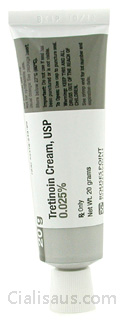Before using Tretinoin cream, it’s crucial to understand how the drug works. Tretinoin is a topical medication primarily used to treat acne and certain skin conditions. It belongs to a class of medications called retinoids and is a derivative of vitamin A. Tretinoin offers several benefits for the skin:
Acne Treatment: Tretinoin is effective in treating both non-inflammatory and inflammatory forms of acne. It works by unclogging pores, reducing the formation of comedones (blackheads and whiteheads), and promoting skin cell turnover, which helps prevent new acne lesions.
When unclogging pores the drug acts as a keratolytic agent by promoting the shedding of dead skin cells and preventing microcomedones formation. Microcomedones are invisible in the naked eye, however they are a sole ground factor to larger comedones. Therefore, during the initial acne stages, Tretinoin keeps the pores clear which eventually also reduce the formation of both black and whiteheads.
Tretinoin is also a cell replacement acceleration agent. For most adults under 50 years old, it takes around 28-42 days for skin cells to regenerate. When an increase turnover is enhanced, dead skin cells and debris in hair follicles are eliminated by preventing their build up. The blockage of pores usually leads to acne. Acne is also associated with inflammation of the skin.
Tretinoin cream reduces the redness and swelling of pimples and acne lesions. It does so by triggering the immune response in the skin. Tretinoin also improves the appearance of existing acne by promoting the healing of acne lesions and reducing post-inflammatory hyperpigmentation. It is important to remember that just because you are on Tretinoin daily prescription, it doesn’t necessarily mean you can tolerate the usage. On the other hand, using it less often doesn’t guarantee the same great benefits. There are some side effects of the drug, it could vary from person to another. You may experience horrible peeling, dryness etc. You can adjust your usage sequence in moderation to how it affects your skin.
Tretinoin’s effect on Skin cells
Skin Exfoliation: Tretinoin accelerates the shedding of old, damaged skin cells and encourages the growth of new, healthier skin cells. This exfoliation process can improve skin texture, making it look smoother and more youthful. One of the worst things you can do is pick up your face. It can be such a challenge to keep up with. Maybe concentrating on washing your face only can let go the temptation to pick.
It is crucial to listen to your skin and have probable solutions as you need them. You can have charcoal and hydrating masks, exfoliants etc. Make sure you are taking necessary precautions from using too much at a time.
Reduction of Fine Lines and Wrinkles: Tretinoin stimulates collagen production, which can help improve the appearance of fine lines, wrinkles, and signs of aging over time. It can also fade age spots and sun damage.
Treatment of Hyperpigmentation: Tretinoin cream can lighten areas of hyperpigmentation, such as melasma and post-inflammatory hyperpigmentation. It does this by encouraging the breakdown of excess melanin in the skin.

Improved Skin Tone and Texture: Tretinoin can help improve skin tone and reduce redness. It can also make the skin appear more even in color and texture.
Tretinoin cream for a Clear Skin
Prevention of Acne Scarring: By treating acne effectively and preventing new acne lesions. Tretinoin can help reduce the risk of developing permanent acne scars.
Maintenance of Clear Skin: Tretinoin cream is a long-term maintenance treatment to help keep the skin clear and youthful. Tretinoin is helpful in minimizing relapse chances in individuals with an acne history.
Minimization of Enlarged Pores: Tretinoin can reduce the appearance of enlarged pores. It works by preventing the accumulation of dead skin cells and debris in the follicles. Use the drug under the guidance of your doctor.
Tretinoin is available by prescription, and the strength and usage instructions may vary depending on the specific skin condition. Always consult a dermatologist or healthcare provider for a personalized treatment plan.
